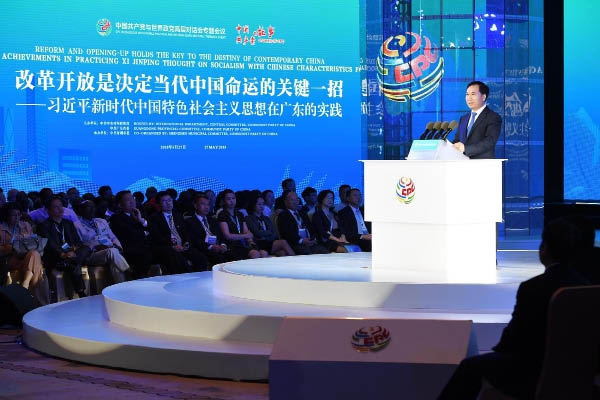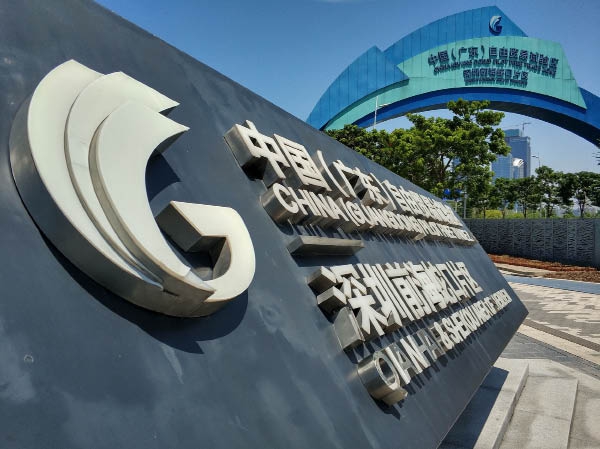By XIA YIPU
By XIA YIPU
THE 19th National Congress of the Communist Party of China (CPC) declared that socialism with Chinese characteristics has entered a new era, which is a new historic juncture in China’s development. Thanks to the opportunities brought about by the country’s reform and opening-up, China, led by the CPC and guided by the theory of socialism with Chinese characteristics, has achieved a tremendous transformation: it has stood up, grown rich, and is becoming strong.
The world is undergoing profound changes, including multi-polarization, economic globalization, cultural diversification, and the emergence of new technologies. On April 10, at the Boao Forum for Asia Annual Conference 2018, Chinese President Xi Jinping delivered a keynote speech, in which he raised the fundamental question of our times, “In this complex and changing world, where are we headed and what is the future of Asia?” Before attempting to answer this question, we have to understand the inspiration that four decades of reform and opening-up has given China, as Xi pointed out in his speech, “For any country or nation to achieve rejuvenation, it must follow the logic of history and the trend of the times in its pursuit of progress and development.”

A themed conference briefing on Guangdong’s achievements in practicing Xi Jinping Thought on Socialism with Chinese Characteristics for a New Era being held in Shenzhen on May 27.
A community with a shared future to seek the wellbeing of the whole human society undoubtedly represents the historical direction of human society’s progress. The development trend of the times is peace, cooperation, openness, connectivity, reform, and innovation. Hence, in the new era, China should integrate its development with that of the rest of the world by opening its door wider and through peaceful cooperation. China should also bring the country’s development to a new stage by advancing reform and promoting innovation, thus shaping itself into a responsible, strong, and modern socialist country, and making the world more peaceful, prosperous, open, and beautiful.
Openness and Connectivity
In his keynote speech at the Boao Forum for Asia Annual Conference 2018, President Xi pointed out that economic globalization is an irreversible trend of our times. “China’s door will not be closed and will only open even wider,” he said.
By furthering its opening-up, China has the chance to better integrate into the world through international exchanges, and become a contributor to the world economy by sharing China’s wisdom and creations with the world. By opening its door wider, China can do more to safeguard world peace, promote its concepts, and show its capacity, charms, and concerns about the future of the human society. In addition, China can take an active role in being a responsible major country. Through the Belt and Road Initiative, China pursues peace and cooperation instead of a geopolitical agenda. In its opening-up process, China has advocated dialogue and negotiation mechanisms instead of seeking exclusionary blocs. By emphasizing equality, respect, mutual benefit, win-win cooperation, and opposing coercion, China aims to become a vindicator of the world order.
China’s reform and opening-up aims to embrace economic globalization in its courageous exploration of development, representing a voluntary integration with the world. Economic globalization, as a trend of our times, is bringing about booming trade, investment facilitation, greater mobility of people, and significant technology development. To develop further, China must open its door, further integrate with the world, and endeavor to build an open and rational world order. Furthermore, China also needs to seize the global strategic opportunity, properly cope with challenges, and take into account both domestic and international situations with the aim to lift China’s development to a new level and thus advance the development of the global governance system towards being fairer and more reasonable, creating favorable conditions for China’s development and world peace.
When a country takes an isolated development path, only concerned with protecting its own interests and trying to avoid risks in the outside world altogether, it loses the drive for sustainable development. As President Xi pointed out in his speech at the conference marking the 200th anniversary of the birth of Karl Marx, “The integrated world is there. Those refusing the world will finally be denied by the world.”
Reform and Innovation
In the early days of its reform and opening-up, China leveraged its comparative advantage of abundant and cheap work force by encouraging small-scale labor-intensive industries, and then secured a large share of the domestic and international market. This development strategy conforming to China’s conditions at the time greatly propelled China’s economic and social development. As China’s national strength continues to grow, industrial capital accumulates, and industries upgrade. Supported by abundant capital, China has formed its late-comer advantage as a developing country by learning and acquiring advanced technologies and industrial practices of developed countries. During the course of China’s reform and opening-up, its comparative and late-comer advantages have directly accelerated China’s economic development and laid a solid foundation for socialism with Chinese characteristics to enter the new era.
As the world market expands and the political landscape changes, China is moving even closer to the world center stage. China’s manufacturing sector is facing an array of new problems related to human and natural resources, and China’s comparative and late-comer advantages are waning. The role of the world’s factory is no longer suitable for China. Transformation is inevitable. The key lies in innovation and developing core technologies with independent intellectual property rights.

The Qianhai & Shekou Area of Shenzhen, China (Guangdong) Pilot Free Trade Zone (FTZ).
Innovation, as the first driving force of a country’s development, constitutes the strategic support for China to build its modern economic system. Only constant innovation can provide the drive for sustained economic growth. Over the past few decades, the courage and determination of the Chinese people to innovate has impressed the world. High-speed trains, shared bikes, mobile payments, and online shopping, which have all experienced booming development in China, have made the world marvel at the Chinese people’s creativity and wisdom. The importance of innovation and reform has been emphasized in Chinese culture since ancient times, and now they have become part of the nation’s daily practices.
During the dynamic process of its reform and opening-up, China, which started with catching up and copying advanced economies, is gradually growing into a proponent of new concepts, inventor of new technologies, and pioneer of new trends.
Cooperation and Shared Benefits
As a trend of our times, economic globalization also serves as a means to allow people all over the world to share the developments of humankind and enable all countries and nations to share the benefits brought about by globalization. Aiming to make more contributions to human society, China has promoted global governance concepts of extensive consultation, joint contribution, and shared benefits, and endeavored to safeguard and perfect the multilateral trading system, in a bid to make economic globalization more open, inclusive, balanced, and beneficial to all.
Increasing connectivity and interdependence among countries has also brought more instabilities and uncertainties. The old system of global governance established by capitalist powers is being eroded by its intrinsic drawbacks and challenged by emerging economies. As a representative of emerging economies and developing countries, China is seeing its influence on global governance rising rapidly. With its deep involvement in global governance and having taken on more international responsibilities, China is exerting more influence on the global economy and providing more timely, effective, and diversified public goods.
On many occasions, Xi has indicated that China welcomes other countries aboard the express train of China’s development. He quoted an Arab proverb, “he who travels alone goes fast, but he who travels with company goes far.” Xi’s views have fully demonstrated China’s international vision to seek common progress for the whole of human society, in striking contrast with the hegemonic stability theory popular in the West. China sincerely welcomes other developing countries to tap into opportunities in China’s development as it intends to realize shared benefits in its opening-up, thus promoting fairness and equity.
A united world is a concept of traditional Chinese culture about an ideal society. “The human community” was put forward by Karl Marx on the basis of joint labor, with society collectively owning all means of production. A community with a shared future for mankind was proposed by President Xi based on a scientific prediction of the development trend of human society. The three concepts converge on their goals of seeking true freedom and liberation of human beings and pursuing their wellbeing and development.
In this sense, China’s new era also belongs to the world. In a world of a growing interdependence, it’s a wise option for countries to make the most of globalization, abandon zero-sum mentality, and jointly cope with challenges facing mankind. By consulting with each other on development strategies, countries can jointly build the world order and share benefits.
The decision to start the reform and opening-up drive 40 years ago was critical for China’s development trajectory, and was also required by the demand to liberate and develop the country’s social productive forces. Four decades of relentless endeavors have not only improved China’s socialist system, but also ushered in a new era for the country to complete its building of a moderately prosperous society and build itself into a great modern socialist country. China’s successful experience in developing socialism with Chinese characteristics has instilled new vigor and vitality in the world’s multi-polarization process. It offers a new option for other countries and nations who want to speed up their development while preserving their independence. With reform as its intrinsic impetus and opening-up as its outside driving force for development, China is moving even closer to the world center stage, and poised to make more contributions to the world.
In the new era, China will further its opening-up and innovation. Connecting China’s national interests with the wellbeing of the whole human society and striving for freedom, liberation, and happiness of all human beings in its upholding and developing socialism with Chinese characteristics is the best celebration of the 40th anniversary of China’s reform and opening-up, and of the 200th anniversary of the birth of Karl Marx.
DR. XIA YIPU is a research fellow with the Research Center of Xi Jinping Thought on Socialism with Chinese Characteristics for a New Era under the Chinese Academy of Social Sciences.